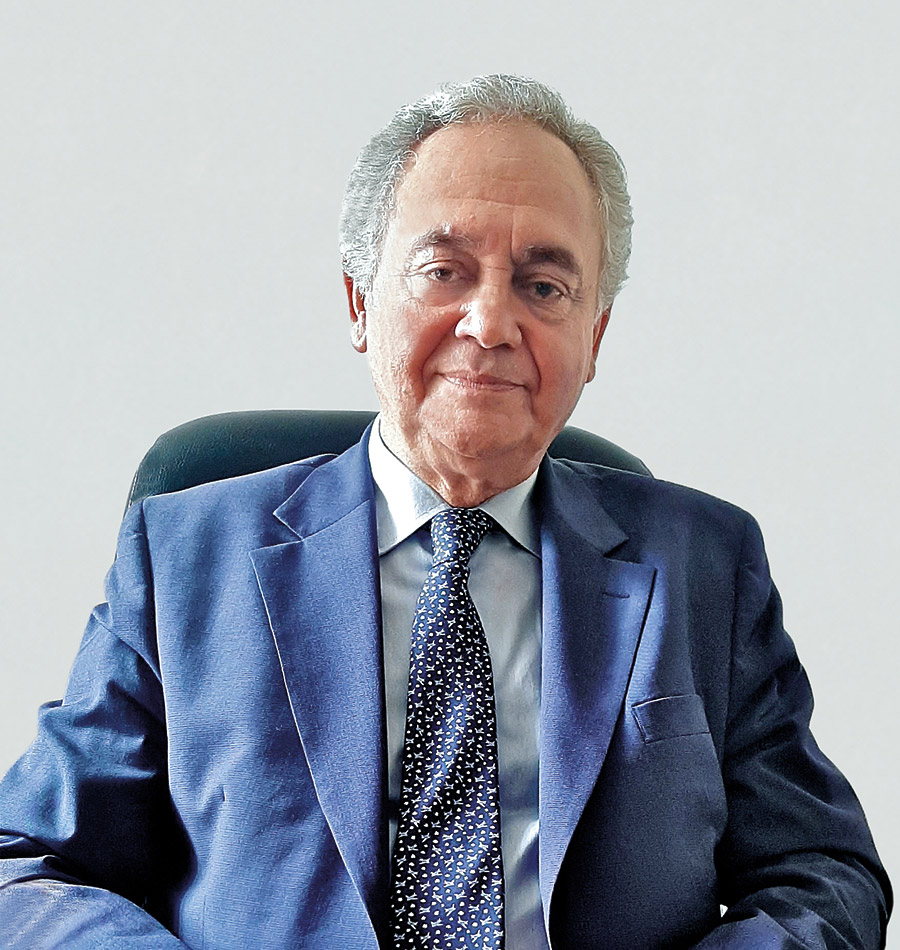Interview
José Lopes da Mota
Judge in the Supreme Court of Justice, Portugal
In this interview, the distinguished interviewee was urged to discuss the evolution of pretrial detention and other pressing themes of judicial theory and practice in recent decades in Portugal and the broader European context.
The honourable José Luís Lopes da Mota offers a comprehensive vision supported by his professional experience and the dedication of several decades to criminal justice.
The following text results from the fruitful conversation that JUSTICE TRENDS Magazine had the privilege and honour to conduct. This exclusive interview aims to elucidate readers about the most striking aspects and progress in criminal matters, focusing on Portugal and Europe.
JT: Early in Judge Lopes da Mota’s long career in the Portuguese justice system, His Honour played a role in pioneering reforms, including a stint in the executive branch as Secretary of State for Justice between 1996 and 1999.
What were the main priorities for criminal justice at that time and what were the main contributions to improving the system?
JLM: The 13th Constitutional Government’s initiatives (1995-1999) in the area of criminal justice had essentially two objectives. First, to consolidate and improve the system that had been re-founded by the Constitution of 1976, including the new Penal Code of 1982, revised in 1995, and the new Penal Procedure Code of 1987, in accordance with the principles of the democratic rule of law based on respect for fundamental rights.
On the other hand, it sought to progress through measures in the prison system and reforms in the system of enforcement of sentences and sanctions. There was a special focus on juvenile justice, an area which had not seen much progress since the 1960s, and young adults, until then on the fringes of any reforms. A major reform was introduced, resulting in the Educational Tutelary Law and the Law for the Protection of Children and Young People.
Once the system had been restructured through the new Codes, it was essential to address the deficiencies and gaps that became apparent through experience. It was also necessary to adopt measures that would be in keeping with the new constitutional framework and with the international law instruments for the protection of human rights, to which Portugal had committed itself [European Convention on Human Rights (ECHR), International Covenant on Civil and Political Rights and Convention on the Rights of the Child], requiring significant intervention.
My responsibilities, as Secretary of State for Justice, were structured around monitoring, directing, coordinating and preparing legislative projects that brought about and created the necessary conditions for the reforms to be effective. It was a gratifying and very demanding job.
The reforms undertaken marked an ambitious time of construction and innovation, which laid the foundations for subsequent developments that redefined significant legal and institutional frameworks.
As regards criminal law, I would highlight the 1998 revision of the 1987 Code of Criminal Procedure (CPP) (Law 59/98), the approval of complementary or related legislation and the revision of the Organic Law of the Public Prosecutor’s Office, in which the creation of the Central Department for Criminal Investigation and Prosecution stands out.
The criminal registry was completely reformed and computerised (Law 57/98), helping to speed up the progress of cases. At the same time, complementary laws were approved, namely: the law on electronic monitoring (Law 122/99), which allowed for more frequent and effective use of house arrest, rather than pretrial detention; the law on witness protection (Law 93/99), which took into account the development of violent and organised crime and crime within the family and closed social groups; and the new law on international judicial cooperation in criminal matters (Law 144/99), justified by the expansion of crossborder crime and Portugal’s integration into the Schengen area.
In the field of substantive criminal law, I would like to highlight the revision of the punishment regime for the offence of issuing bad cheques (DL 316/97). This type of crime represented around 30% of the pending cases and very rarely led to convictions.
I would also like to highlight the consideration given to community service as a sanction. This alternative sentence has considerable scope for resocialisation but was rarely applied, so the practical conditions and appropriate procedures were regulated (DL 375/97). The signing of dozens of protocols with municipalities and other entities allowed this sanction to be favoured as a punishment for petty crime.

The introduction of house arrest with electronic monitoring, in 1998, was also important. In this way, it was possible to ensure the aims of preventive measures, which were previously achieved through pretrial detention, could be fulfilled without resorting to incarceration.
JT: The problem of the excessive use of pretrial detention has worried European bodies such as the Council of Europe and the European Commission. Data from the latest SPACE I Report indicates that 22 out of every 100 prisoners in Europe are in pretrial detention. There are also studies that point to an increase in the numbers of this type of prisoner over recent years. If we look at the development of this method of restraint in Portugal, we find that there has been a significant reduction in pretrial detention in relation to the total prison population over the last two decades.
How would Your Honour describe the development (the application of the measure) of pretrial detention in Portugal in recent years?
JLM: Statistical data shows a sharp decrease in the number of people in pretrial detention over the last two decades, from 30% to 20% of the prison population. Eurostat data from 2020 shows that this figure coincides with the average for European Union countries and is considerably lower than in countries such as Luxembourg, with 43.3%, Denmark, with 37.4%, France or the Netherlands, with 28.5%.
The data from the SPACE I reports for 2020 and 2021 show that the rate of pretrial detainees in the Portuguese prison population as a whole is lower than the average recorded in the member states of the Council of Europe.
Although they must be interpreted in the light of the national situation and the types of crime in question, these data reflect current legislation and the level of compliance with it. We know that it is not enough to change the law. It takes time to implement it in practice and jurisprudence.
The first few years after the new CPP came into force in our country, it still reflected an idea shaped by the old notion of “non bailable crimes”. This led to the deprivation of liberty ope legis, without the need to specifically verify the assumptions of necessity, adequacy and proportionality in relation to the danger of escape, continuing criminal activity, disruption of the investigation and evidence or threat to security and public order.
In its original wording, Article 209 of the CPP still required the judge to justify not imposing pretrial detention for certain serious crimes.
The 1998 revision of the CPP introduced changes regarding the requirement to give reasons for decisions on the application of this measure and the 2007 and 2010 revisions reduced time limits and increased the criteria of proportionality in terms of duration, according to the seriousness of the offences and the categories and types of crime.
The introduction of house arrest with electronic monitoring, in 1998, was also important. In this way, it was possible to ensure the aims of preventive measures, which were previously achieved through pretrial detention, could be fulfilled without resorting to incarceration.
Overall, the way in which the CPP has been applied and enforced reflects the ‘expansion’ of fundamental rights in the context of restrictions on the right to liberty and their link to the presumption of innocence. At the same time, it is in line with the UN and Council of Europe soft law and the jurisprudence of the European Court of Human Rights and the UN Human Rights Committee.
At the same time, support should be provided for decisions relating to the imposition and maintenance of pretrial detention. The proper application of the standards of international law and the recommendations of the UN and the Council of Europe calls for the involvement of pretrial release services.
JT: Pretrial detention is the second most used method of restraint in Portugal according to the Panorama of Criminal Justice 2020 published by the General Directorate of Justice Policy – Ministry of Justice. Of the total number of restrictive measures applied, 29% were pretrial detention.
To what extent would Your Honour agree with those who say that we still have a “culture of incarceration” in Portugal?
JLM: This statement, as an expression of the opinions of those who make it, must be put into context. We have a penal system ethically founded on respect for the dignity of the human person and their fundamental rights, and oriented towards crime prevention and social reintegration.
Deprivation of liberty prior to conviction is limited, in exceptional terms, as a last resort. We have very demanding legal criteria, whose application is made on a case-by-case basis and requires adequate grounds.
From my experience, I would identify two aspects in which I believe it is possible to make significant improvements with immediate effects in relation to pretrial detention: in the system of review of the measure and in the appeals system. Such a development would strengthen the protection of pretrial detainees’ individual rights and the management and efficiency of the process.
The mandatory review of the measure, which is currently quarterly, could be done over shorter periods of two months, in an oral and adversarial debate, with the mandatory presence of the person, which can easily be ensured at least through videoconferencing (following international recommendations on the matter).
The appeal system needs to be simplified and speeded up, so as to avoid rendering appeal decisions meaningless after the measure has been reviewed. Time limits should be substantially reduced, the trial should be oral, as is the case with habeas corpus, and the decision could also be simplified, oral and recorded. This would speed up the proceedings and reduce the time spent in pretrial detention to the absolute minimum.
At the same time, support should be provided for decisions relating to the imposition and maintenance of pretrial detention. The proper application of the standards of international law and the recommendations of the UN and the Council of Europe calls for the involvement of pretrial release services.
A service of this nature would help judges and prosecutors to have important information available when deciding whether or not to apply and maintain pretrial detention. In particular, I am referring to information regarding factors that should be taken into account, such as the person’s criminal record and their “links with the community” (family and social situation, employment, financial resources and property, conditions and duration of residence).
Independent verification of these factors and pretrial surveillance of individuals would allow for better quality justice in this area.
JT: There have been transnational efforts at EU level to lay the foundations for a common basic rights legal framework on the practical application of pretrial detention (and alternative measures). At the same time, we also have initiatives dedicated to promoting the implementation of the European Supervision Order (Framework Decision 2009/829/JHA on the application of the principle of mutual recognition to decisions regarding supervision measures as an alternative to pretrial detention).
What factors prevent greater and more frequent use of alternatives to pretrial detention?
JLM: As in other areas, I believe that a well-founded answer to this question requires research and studies of a criminological and behavioural nature, comparative studies and studies on the application of the current system governing this issue, which we do not yet have.
The existing law is a good law, although it needs some adjustments. What is at stake here, however, are the conditions of its application, which cannot be limited only to the outcome of interactions within official control bodies (judges, Public Prosecutor’s Office and police bodies).
Making judgements on the risks related to escape, disruption of proceedings and evidence, as well as threats to security and public order, are difficult to assess in urgent cases like those that the courts are faced with when deciding on the application of preventive measures. It also requires greater investment in information gathering, beyond the strictly legal aspects.
JT: Your Honour has always been actively involved in judicial cooperation issues, including serving as President of Eurojust. This Agency supports national authorities in the use of instruments of judicial cooperation between EU Member States, such as the European Union’s Framework Decisions, Nos. 2002/584/JHA [1], 2008/909/JHA [2], 2008/947/JHA [3], 2009/829/JHA [4] e 2009/299/JHA [5].
What would Your Honour highlight regarding the need, importance and challenges of judicial cooperation in the field of criminal justice, particularly in the context of the European Union?
JLM: I have devoted more than twenty years to building a European criminal justice system, even before I was put in charge of these matters as Secretary of State, from 1996 to 1999.
I had the privilege and honour to have been a member of the pioneering team of Eurojust and to have been its President, elected by my colleagues who represented the 27 Member States. These were times of extraordinary challenges in which decisive progress was made in crucial areas, through a profound spirit of cooperation, despite and respecting differences.
The legal framework for judicial cooperation in criminal matters within the EU involves various aspects of alignment of national criminal and procedural laws in areas covered by the Treaties, which are necessary for the effective operation of the principle of mutual recognition. This principle is currently the basis for cooperation and for practical measures and mechanisms for working together.
In essence, there is a structured framework in which various legal instruments of the EU intersect and complement each other, in a logic of coherence and cohesion, guaranteed by the system of fundamental rights protected by the ECHR and the Charter and by the jurisprudence of the European courts that bind the Member States.
The major challenges we face today are essentially the coherent application of this complex set of rules, which defines a European criminal justice system in an advanced stage of construction.
Criminal justice has acquired a European dimension, requiring the courts, as protagonists of cooperation based on direct contacts, without the mediation of political, administrative or diplomatic bodies, to interpret and apply national and European law in this context. In my opinion, this is the great challenge to which the national criminal justice systems, with their own guaranteed independence, must respond in an effective way in the defence of security and the protection of citizens’ rights. To achieve this, it is essential to invest in training.
The European Arrest Warrant (EAW) must be viewed in this light. The EAW has replaced the multilateral extradition mechanisms between Member States, in particular for the purposes of criminal proceedings.
Essentially, an EAW, by virtue of the principle of mutual recognition on which it is based, is a judicial decision to deprive a person of his or her liberty in order to stand trial. In other words, it will only be justified if the preconditions and requirements for pretrial detention are met, in accordance with the ECHR and the Charter.
Furthermore, under the Treaties, a person may not be discriminated against on the grounds that he or she is visiting, is a citizen of, is travelling through or is resident in the territory of a State other than the State where the proceedings are taking place. Therefore, before issuing an EAW, the issuing judicial authority must consider less onerous measures.
That is why the EAW scheme must be permanently reconciled with the Framework Decision 2009/829/JHA concerning the application, between Member States of the European Union, of the principle of mutual recognition of decisions on supervision measures as an alternative to pretrial detention. As far as experience shows, there is still a long way to go in this area.
Notes:
[1] On the European arrest warrant and the surrender procedures between Member States
[2] On the application of the principle of mutual recognition of judgments in criminal matters imposing custodial sentences or measures involving deprivation of liberty for the purpose of their enforcement in the European Union
[3] On the application of the principle of mutual recognition to judgments and probation decisions with a view to the supervision of probation measures and alternative sanctions
[4] On the application, between Member States of the European Union, of the principle of mutual recognition to decisions on supervision measures as an alternative to provisional detention
[5] Enhancing the procedural rights of persons and fostering the application of the principle of mutual recognition to decisions rendered in the absence of the person concerned at the trial.
José Luís Lopes da Mota
Judge in the Supreme Court of Justice, Portugal
José Luís Lopes da Mota has been a Judge in the 3rd Criminal Chamber of the Supreme Court of Justice in Portugal since September 2017. Previously he was Deputy Prosecutor General for six years, in charge of criminal cases at the Lisbon Court of Appeal and responsible for the coordination of judicial cooperation in criminal matters. Between 2001 and 2010 he was at Eurojust – The European Union Agency for Cooperation in Criminal Justice, and was President of this body for more than two years (2007-2009). He was Secretary of State for Justice between 1996 and 1999, in the 18th Constitutional Government (led by António Guterres). He graduated in Law from the University of Lisbon in 1977.


